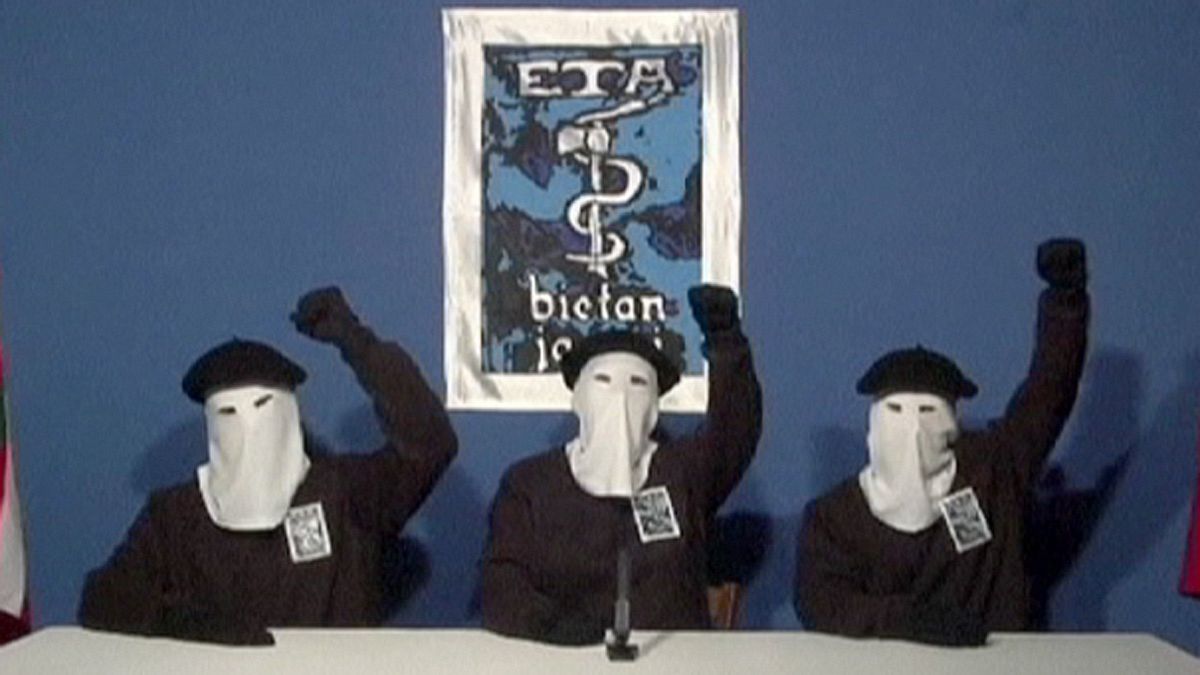The autonomous northern Basque region in Spain votes to elect a new government on Sunday, one year after the armed separatist group ETA renounced violence.
Now, under an ETA-declared permanent cease-fire, following more than 30 years of bloodshed, pro-independence parties are forecast to do well in the local polls.
But in building a political future the Basques cannot ignore their past, in which more than 800 people were killed and many more maimed by ETA.
Cristina Sagarzazu’s husband was a local policeman. ETA branded him a traitor and put a bomb in his car in 1996. He and Cristina had two sons together. Her family is one of the many emotionally scarred who struggle to come to terms with the political present.
Cristina Sagarzazu told us: “The other day, just testing the waters, I asked my younger son a question; he’s 17. I said: ‘What if they released all the prisoners into the street?’ And he said: ‘Including those who killed?’ ‘Yes,’ I told him. ‘No,’ he said. Now I told him: ‘They killed, but so what? They will be set free.’ …I don’t think we’ll close the wounds like that.”
Then there are the parents of the ETA members who are held in prisons far away. Arantxa Otaegi has to travel 900 kilometres if she wants to see her son, who is serving a 20-year sentence for attempted murder. She also has trouble forgiving.
Arantxa Otaegi said: “I am sorry about all those who died, the victims and their families. But we have also had deaths on our side, and no one remembers them. Must we ask for forgiveness? If so, let them ask for ours, for everything they did to us.”
Many Basques still remember Spanish dictator Franco’s reign of terror.
He bombed them in the Civil War, banned their language and oppressed them, contributing to the eventual retaliatory violence.
The letters E-T-A stand for ‘Basque Homeland and Freedom’.
Ahead of the regional elections this weekend, we reviewed the year that has passed without the threat of attacks.
Txema Urkijo, the deputy head of the Basque government office assisting the victims, deals daily with the pain and the damage left by ETA. We spoke to him in Bilbao about continuing collective efforts.
Javier Villagarcía, euronews:
“How can we return to normal after ETA terrorism has destroyed so many lives?”
Txema Urkijo, Basque Government Victims Support Office:
“Basque society is very small. We are barely 2,100,000 inhabitants, and violence has reached every corner of this society. I believe there will have to be a painstaking process of healing, an effort which involves everyone. This must include the recognition of all the victims, and reparation for all of them. There must be a conservation of memory, and this, notably, has to include investing in something very important: education – education in values and education of tolerance, which should allow people to live together peacefully and democratically. It will take time.”
euronews:
“The Basque nationalist left, Abertzale, ETA’s political wing, has said it regrets the consequences of ETA’s armed action, and recognises the pain inflicted on the victims of terrorism. Is this enough?”
Urkijo:
“What they’ve done so far is to recognise that there is this grief, but the characterisation of the grief is lacking. It’s as if they were victims of an earthquake, a natural disaster, who received people’s compassion. Beyond recognising the existence of the pain there is recognition of its origin, its wrongful cause. Those who caused it must recognise that – those who did it and who supported or encouraged it. Therefore, the main task remaining for the Abertzale left is not only to recognise the grief but to admit that having caused it was bad, with the self-examination that goes with that.”
euronews:
“You, the Basque government, have organised meetings between the victims of terrorism and repentant members of ETA. What results came out of that?”
Urkijo:
“It was really positive. The number of cases is limited; there were barely a dozen of them, but it let us verify that among ETA prisoners there are some… even if there aren’t many it is qualitatively significant. A number of people were able to realise that violence is not only wrong when it is disruptive, when it is used to defend a political project or political ideas, but that it was wrong since the beginning. They admitted that they made a mistake, and that their error led them to commit irreparable harm against many people. They wanted to express that directly to the victims, to the people whose own flesh suffered, to recognise their responsibility and to ask to be forgiven. In this way, to reiterate, the dozen cases we were able to organise were very satisfying, as much for the prisoners themselves as for the victims, whose satisfaction was enhanced by knowing that these prisoners were not benefiting from a trade-off in terms of any lightening of their sentences. This was a guarantee of sincerity in the asking for forgiveness.”
euronews:
“There are regional elections in the Basque Country this Sunday, the first since ETA renounced armed action. What expectations do you have for the candidates who are elected?”
Urkijo:
“They must be aware of the historic moment and the historic opportunity they have before them. The government will bear the responsibility and the obligation to consolidate the terrorism-ending process, to consolidate the cohabitation process, to reinforce the initiatives that will contribute to the improvement of peaceful, democratic coexistence in the Basque Country. And for that they must take into account that any initiative in this domain must come out of a consensus among the political forces.”
